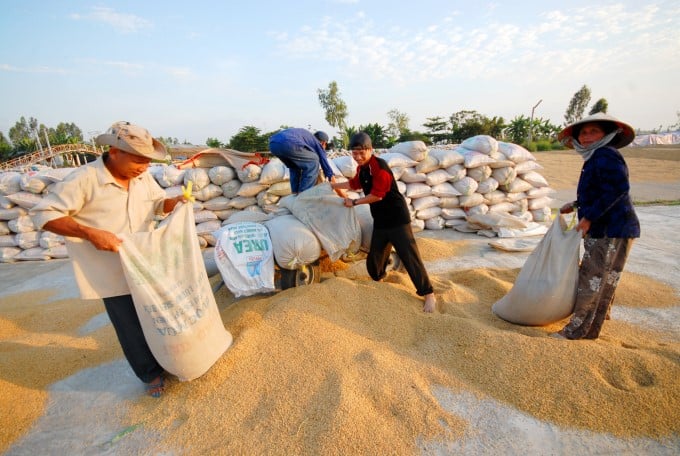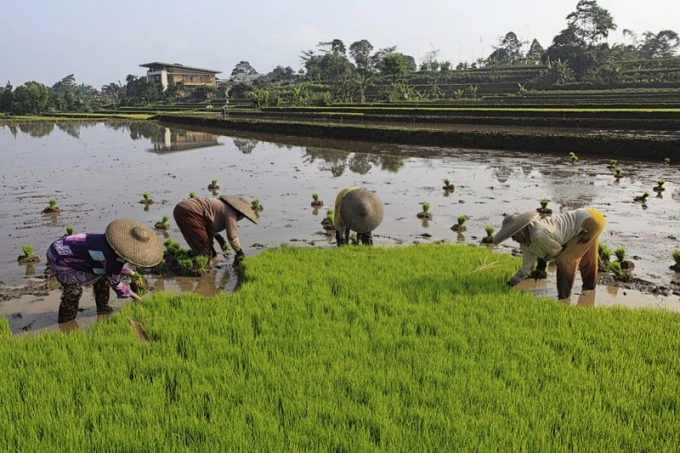May 24, 2025 | 16:27 GMT +7
May 24, 2025 | 16:27 GMT +7
Hotline: 0913.378.918
May 24, 2025 | 16:27 GMT +7
Hotline: 0913.378.918

Harvesting rice in the Mekong Delta, Vietnam. Photo: Le Hoang Vu.
According to Bloomberg, rice is the most consumed commodity in the world, and is a daily source of nutrition for more than 3 billion people globally.
Many agricultural products such as corn, soybeans, meat, and rice remained unchanged despite the upward trend of global prices. Besides, rice also helps to prevent a food crisis that will spread over in the future.
Rice prices have tended to decrease in recent months although it is higher than last year. The leading exporting countries such as Vietnam, Thailand and India have improved supplies from new harvests that is the reason for this decrease in rice price.
Bloomberg said that rice prices are in less fluctuation because they only serve daily needs. Meanwhile, other food crops have been caught up in the boom in demand for feed, especially pig production in China.
The Chinese government has purchased large stockpiles of wheat and rice that are believed to be able to feed an entire population of 1.4 billion people within a year. They have even urged domestic feed mills to buy whole grain from stockpiles into state warehouses to replace corn and soybean meal on the purpose of limit the country's dependence on supplies from foreign.
Because of the erratic weather in China, the world supply of grain and oilseeds has decreased. It pushed corn and soybean prices to the highest level in more than eight years.
This trend can be seen in wheat. It is grain which was originally used for food such as bread, pasta, or biscuits, now replaces corn and soybeans for animal feed. Wheat prices, therefore, are on the rise.

Indonesian farrmers on the field of Bogor. Photo: Getty.
Since August 2020, wheat prices increased by more than 40%, but lower than maize (120%) and soybeans (70%). Rice prices in Chicago increased by 22%, while the price in Asia inched up 4% only.
The World Bank and the United Nations both warned of the danger of food insecurity. The spike in food prices has caused riots in more than 30 African, Asian and Middle Eastern countries. The 2008 and 2011 world financial crises will probably come back sometime.
“Stable rice prices are good news for global food security, especially in poor areas like Europe. Asia is a place where rice is the staple food’, says David Dawe, The senior economist at the United Nations Food and Agriculture Organization (FAO).
According to FAO, the primary risks to food security are at the country level: Higher retail prices, combined with reduced incomes, mean more and more households are having to cut down on the quantity and quality of their food consumption.
Numerous countries are experiencing high food price inflation, reflecting lingering supply disruptions due to Covid-19 social distancing measures, currency devaluations, and other factors. Rising food prices have a greater impact on people in low- and middle-income countries since they spend a larger share of their income on food than people in high-income countries.
FAO estimates that the number of undernourished increased from 624 million people in 2014 to 688 million in 2019. Covid-19 is estimated to have dramatically increased the number of people facing acute food insecurity in 2020-2021. As of April 2021, it is forecasted that 296 million people in the 35 countries where it works are without sufficient food, 111 million more people than in April 2020.
In the short term, rice is not under pressure to increase prices. The La Nina phenomenon brings a enormous level of rain for Asia, where more than 90% of the world's rice is produced. In contrast, La Nina caused drought in America. The two main producers of corn, soybeans and wheat, the US and Brazil, were affected, making the supply of these grains constricted.
India, the world's largest supplier, has harvested record quantities of rice in the past few years and traded at low prices. This leads that rice prices have not increased.
Chookiat Ophaswongse, honorary president of the Association of Thai Rice Exporters, said: “Even when sales from Vietnam and Thailand fall, rice prices will hardly increase because supplies from India and Pakistan".
Rice production from Thailand, the world's third-largest exporter, is likely to increase due to higher rainfall this year, according to Chookiat. Therefore, the rice price will always be limited by the large reserves in China and the export capacity of India and Asian countries.
However, due to the sharp increase in corn and soybean prices, the world’s poor have also been threatened with an increase in meat prices. It is still at risk of food insecurity.
“High corn prices will put pressure on pork and poultry prices. This makes it difficult for low-income families to buy fresh foods. The rice is guaranteed, but the meat is not. The nutrition of young children, so it is difficult to guarantee ”, Mr. Dawe emphasized.
Translated by Ha Phuc

(VAN) In the tranquil wetlands of Van Long, there are quiet souls who guard the forests, nurture the waters, and oversee every bird and troop of langurs as protecting the essence of a living heritage.

(VAN) WWF, GIZ, IUCN, UNDP call for biodiversity conservation and sustainable development must be regarded as a unity in strategies for a green future.

(VAN) On celebration of International Day for Biological Diversity, Deputy Minister Nguyen Quoc Tri called for practical actions to address nature and biodiversity conservation.

(VAN) Dr. Hoang Thi Thanh Nhan – Deputy Director of the Nature and Biodiversity Conservation Agency – highlighted this on the International Day for Biological Diversity, May 22, 2025.
![Ho Chi Minh city adapts to climate change: [2] Accelerating action](https://t.ex-cdn.com/nongnghiepmoitruong.vn/608w/files/chiqk/2025/05/22/4024-4220-bien-doi-khi-hau-1-100626_766.jpg)
(VAN) Clearly recognizing the challenges posed by climate change, Ho Chi Minh city has swiftly shaped its policies and implemented practical solutions to adapt.

(VAN) Rice straw is no longer just a discarded byproduct, but it is becoming a green resource that helps farmers in the Mekong Delta reduce emissions and promote circular, sustainable agriculture.

(VAN) Other Effective Area-based Conservation Measures (OECMs) are solutions that contribute effectively to achieving the goals of the Kunming–Montreal Global Biodiversity Framework.